A solar blanket helps to both heat the water, and retain the heat at night, or prevent heat loss from cool air temps or heat robbing winds.
Solar covers will add heat to the pool to a greater or lesser degree, depending on 1) amount of surface coverage and 2) amount of direct daily sunshine. For a pool that is completely covered by a solar blanket, and one that gets at least 6 hours of direct sunlight on the pool, a 10-15 degree F gain is not unusual.
Solar covers will also reduce heat loss and evaporation by as much as 95%, depending on 1) amount of surface coverage and 2) average nightly temperature. As nights turn cooler, and the differential between water temp and air temp increases, it becomes less effective at reducing heat loss, but still is the best way to do it!
Studies on Solar Cover Effectiveness
2014 research produced a study by Colgate University on the use of a pool cover for 7 hours each night with the result of energy cost savings of over 30%, for the Lineberry pool on campus. And in 2012, A Michigan Energy Office case study on Chesaning Union Middle School pool showed a 50% reduction in energy use, with the unexpected benefit of reducing humidity inside the indoor pool structure. A study in Australia as early as 1963, showed that ‘clear plastic film’ could be used to both halt evaporative heat loss, and for sunny outdoor pools, would also absorb solar radiation to warm the water.
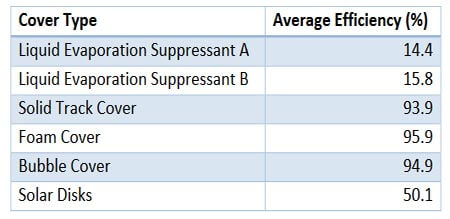
A 2016 study by Cal Poly was performed on 12 test pools to measure the evaporation control effectiveness of solar covers, solar rings and liquid solar blanket. They did not measure energy savings or heat gain, but instead focused their efforts on helping pool owners control pool water evaporation, a big issue in drought ridden California.
The results of the study, summarized in the chart shown here, was that automatic covers, solar covers, and foam covers all perform at the same level of effectiveness; about 95% efficient. Solar rings, which leave open and uncovered areas between the round disks, reduced evaporation by about 50%.
Liquid evaporation suppressants, more commonly known as Liquid Solar Blanket or Solar Fish, didn’t fare so well, although the researchers denote that high winds and storms during the period may have reduced their effectiveness. Other studies done on chemical films to reduce evaporation have produced higher levels of effectiveness, in the 20-40% range.
Discussion:
The recent Cal Poly study did not measure heat gain or energy savings, although evaporative heat loss could be used as a proxy for energy costs. It is conceivable that Solar Rings could have a greater BTU heat input than solar blankets, since they are thicker than solar covers. In fact, manufacturers claim that Solar Rings do have greater BTU heat transfer than Solar Blankets, but this was not tested.
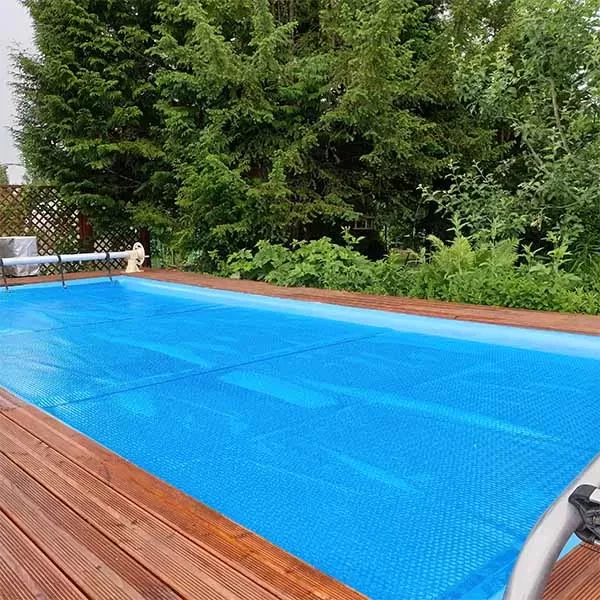
Other questions come to mind, such as; what is the effect of blanket color on heat transfer. How do Clear, Blue or Silver Reflective solar blankets compare to each other? And what about the thickness of the solar blanket (or Solar Rings which are much thicker and presumably longer lasting); does a thicker solar blanket gain more heat or prevent more evaporative heat loss? And could a Liquid Evaporation Suppresant possibly be formulated that would also absorb solar radiation; adding heat to the pool water?
Perhaps further solar pool cover studies will answer these questions. Many thanks to the Cal Poly researchers, and the NPC for funding such a fine consumer-centric study, that will surely be cited in future research for decades to come.
Conclusion: Solar Covers do really work! Both to retain heat and reduce humidity, and when used on outdoor pools, they also add heat to the pool (Liquid Solar does not add heat). There seems to be a bit of a trade-off in convenience for effectiveness within this product category. There’s no apparent shortcut, the larger, bulkier solar pool covers just do a better job!

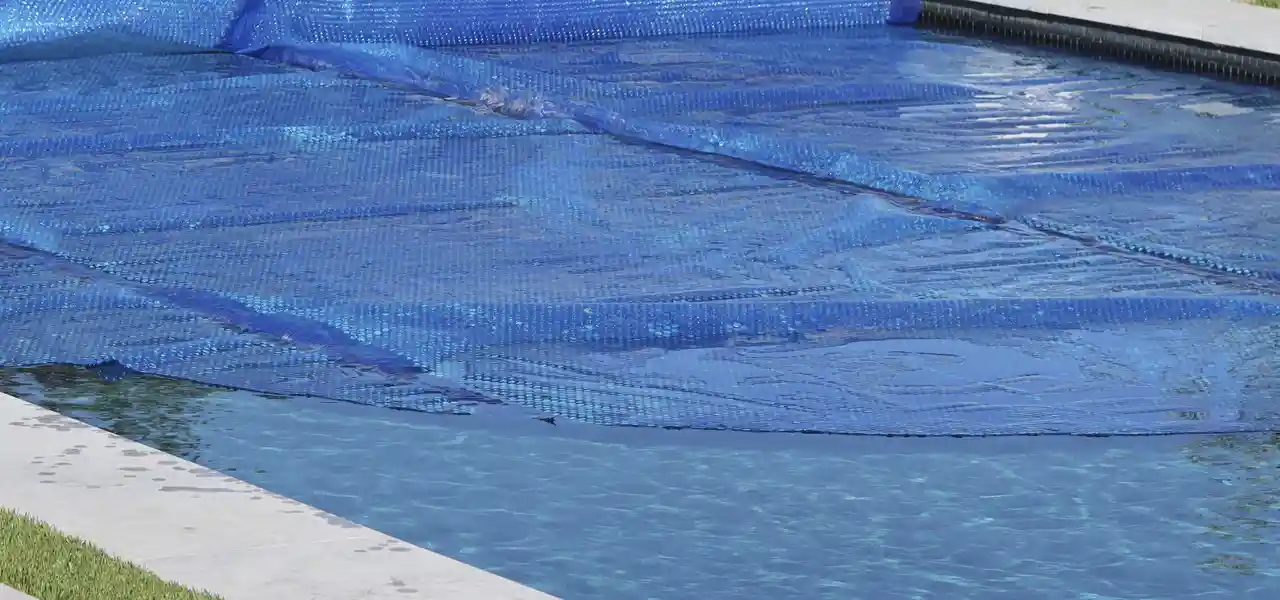
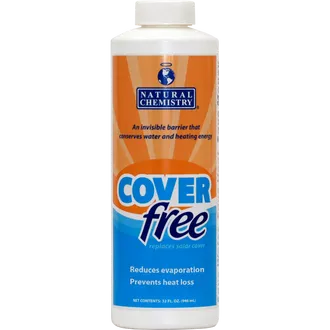
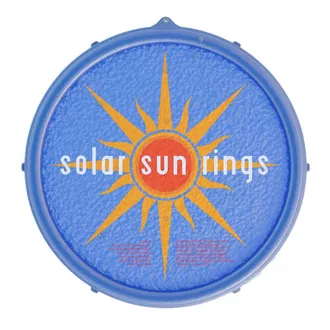
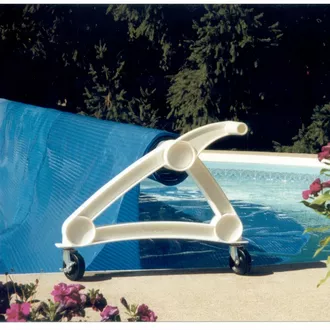
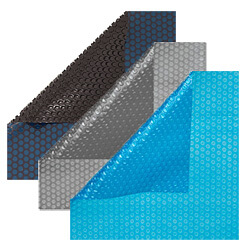
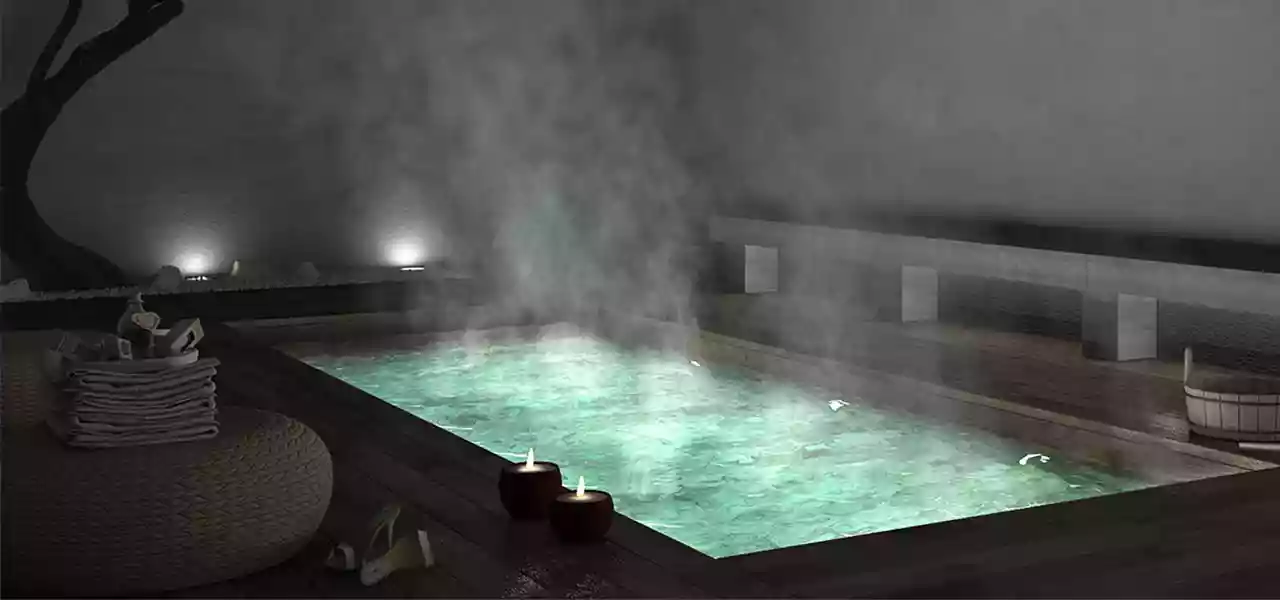
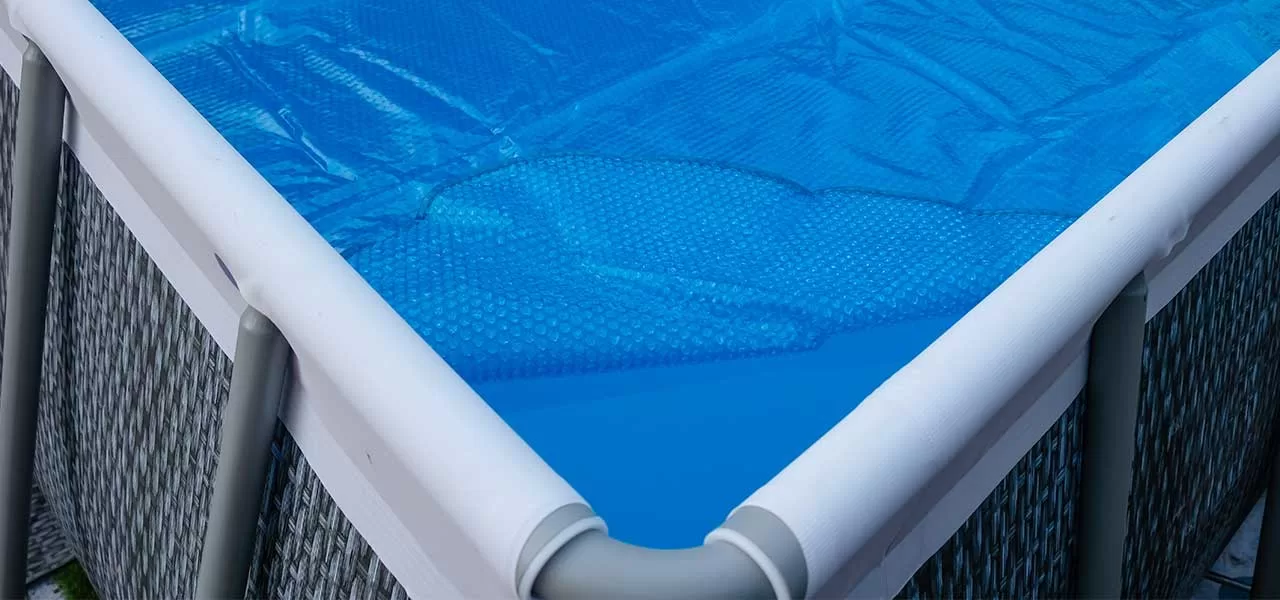
Is there any benefit to using a solar blanket alongside a liquid solar product?
Hi Tina, no I don’t think so, I would just use one or the other.
pool temp is now 63, and I want to get it to 70 for the next 3-4 weeks. Will my solar cover do the job? we get about 5-6 hours of direct sun on the pool.
I would think so, 7 degrees? sounds feasible. Are you really going to swim though, in 70 degree water? Brrrr! That’s cold, man!
Hi quick question. I notice some covers are black on the bubble side. I take it is good as it absorbs heat better but also it blocks out the sun from hitting the pool?
Yes, good observation, so they tend to absorb heat better, but not deeper into the water. Not sure if they transfer more heat or not, but if so, it is not much.
If I put 2 solar cover on top of other will the pool still heat efficiently? Also if I use 2 solar covers well it retain heat a lot better one solar cover 12 mil
Javier, I’m not sure about that, having never tried it. The blanket on the bottom could possibly become damaged (burned), as the sunlight prisms thru the bubbles of the top blanket. I would think that two blankets would retain heat better than one, but maybe just a very small amount. Probably best to store the second blanket indoors, where you can use it in a few years, as the first one wears out.
I heard that leaving a solar cover on my above ground during sunlight for several days and nights could cause algae blooms. I don’t understand how to use this to keep my pool warm. I am in upstate NY and the temps are going down to 50 degrees at night. Please tell me how to use my Solar cover. Thanks
Hi Lisa, urban myth! solar covers cannot cause algae. Algae is caused by low chlorine, high pH, poor filtration, algae spores brought in on the wind, or on swimsuits used in lakes/oceans, but not from the solar cover. Keep the cover on the pool to warm it during day and retain heat at night. But do remove the cover after shocking the pool, and keep off until chlorine level is normal again. Store the blanke, when folded or rolled, in the shade.
How can a solar cover “add heat”? There’s a finite amount of sunlight hitting your pool at any particular time, and no cover can increase that. It can certainly reduce heat loss, both through reduction of evaporation and reduced convection, but I don’t see how it can “increase” it.
Care to explain?
Hi Steve, solar blankets increase the heat of the sun rays by heating up the air pockets contained in a solar cover and then transferring that heat radiation into the water. They also reduce ray deflection off of the pool surface, and also focus the rays thru the bubbles deeper into the water
Reducing deflections off the surface I can see, although that would appear to be limited. But “heating up the air pockets”; wouldn’t that be as efficient as heating the water directly? And as far as “focusing the rays” is concerned; you’re talking about a little bubble of air with very little plastic surrounding it; the amount of focusing is going to be limited (plus, your filter circulating the water should have the same effect of ensuring the pool is an even temperature)
Does using two solar covers work better than one , I have a clear one and a blue one.
No, I don’t think so, the one on top may damage the one underneath, due to the refraction of the sun’s rays, it could ‘burn’ the cover beneath.
Our pool is always in the shade, no sun. It gets 100 degrees here though. Can a solar cover help heat the pool without sun?
Hi Pam, good question. The answer is no, it won’t add heat to the pool, but it will help to retain the heat that is lost at night during cool nighttime temps.
Mr Merino, Thanks for the great information on this blog! Between your informative discussion and the questions you answered I feel much more knowledgeable about solar blankets.
Hi… I’m wondering if putting the black pool cover that came with the pool would help or hinder, if we put it over the solar cover? The water is still so cold after a week of waiting!
The winter cover will not help warm the pool, if put over the top of the solar cover. Just the solar cover alone, bubble side down.
Do you think the pool covers work better if the pump is off and not circulating
Hi, not sure if it makes a difference? Interesting question. Maybe you want to run an experiment?
My pool water is 62 degrees. The weather outside is now reaching about 75 degrees and the pool is in full sun. I understand putting the solar cover at night when temperatures are going down into the 50s, but would I be better to take the cover off during the warm day time? Or does the pool warm up better with the cover on? Does it matter whether the pump is running or not?
Andrew, the prism of the sun’s rays into the water (bubble side goes down), is what helps to warm the water. Yes, solar covers do warm the water, up to 15 degrees. And they also prevent up to 95% of evaporative heat loss. Does not matter if the pump is running, although that will help to distribute the heat. Leave the cover on during the day. maybe your thermometer is incorrect?
I have an oval shape cover on a rectangular pool. Will I lose some of my heat ?
Yes, you will lose some, about equal to the percentage of surface area that is not covered. If it’s 10% not covered, you are losing 10% of effectiveness, not heating that area, and not stopping heat loss in those areas. But don’t sweat it, it’s not much loss.
I have the opposite situation. I just got a rectangular cover for an oval pool, where the corners are laying on the deck. Does trimming the cover to lay perfectly flat on the water’s surface improve efficiency? Am I losing anything by creating air vents at the corners?
Thank you
Hi Kevin, yes you are losing a little bit, but not much. The cover does need to be touching the surface, for ‘best results’. But, if leaving it rectangular has some benefit for you, go for it. 🙂 No biggie.
Kevin you are loosing a little bit but if in your situation I would leave the shape as it will save you great deal of work trying to get the cover off every day (or when ready to use) …rectangle is waaay easier deal with than circle or oval.
Do the bubbles on the solar cover go in the water or out?
Hi Gary, place the bubble-side down, flat side up